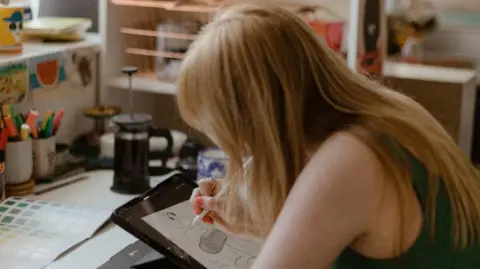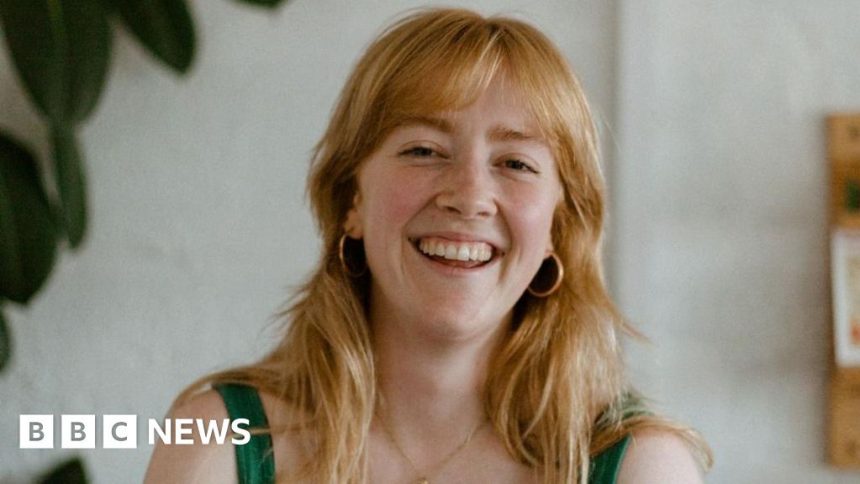Artist hopes to raise awareness of ADHD in women
 Rachael Reid
Rachael ReidAn illustrator from Bristol, who felt on the “edge of burnout” before being diagnosed with ADHD, is calling for increased awareness of the condition in the workplace.
Ana Jaks from Stokes Croft was diagnosed with attention-deficit hyperactivity disorder (ADHD) in 2020 at the age of 27.
She is now part of a campaign called Staring Back At Me, which was created to combat ADHD stigma, particularly around women and non-binary people.
“I thought it was normal for people to feel as constantly stressed as I did,” said Ana, describing her work life before diagnosis.
 Arielle Shear
Arielle ShearStaring Back at Me is a disease awareness campaign, aiming to help people recognise the symptoms of ADHD, while highlighting the stigma that women may face in the workplace.
The first phase of the project, which focused on signs and symptoms of ADHD, was launched in 2022, while the second phase, which focuses on ADHD in the workplace, was launched in October.
As part of the campaign Ana designed illustrations for the lining on suit jackets that represent the invisible nature of ADHD in the workplace.
The illustrations featured inside the linings of the suit jackets, which were worn by two ambassadors in the campaign’s movie.
“I hope other women with ADHD do not fear being seen,” said Jenny Mclaughlin, Staring Back at Me campaign ambassador.
“I hope this campaign and my story shows the strengths someone with ADHD can bring to the workplace.
“All we need is the right environment and support to thrive.”
 Arielle Shear
Arielle ShearBefore the increase in ADHD awareness, Ana said she felt she had to “mask” her condition while at work, which only exacerbated her symptoms.
“Eventually you start to slip and you start to wobble and fall apart. The longer that you’ve been doing that, the more severe the collapse of that is going to be.”
“You’re pretending to be something that you’re not and that imposter syndrome turns into self-esteem issues and it can manifest itself as anxiety and depression.”
Although we are now seeing an increase in awareness of ADHD, approximately 50-75% of women remain undiagnosed and there is still a lack of understanding of the condition, said Professor Amanda Kirby, chair of the ADHD Foundation.
“This is especially true in the workplace,” she added.
 Rachael Reid
Rachael ReidADHD is a neurodevelopment condition that can cause differences in the way people think, learn, process and behave.
Research conducted in 2018 found that up to 75% of women living with ADHD are currently undiagnosed in the UK.
Research shows that women are consistently under-diagnosed in childhood.
According to the National Library of Medicine, ADHD symptoms present differently in girls and boys, with girls exhibiting more “internalised” symptoms such as distraction, disorganisation and forgetfulness.
Adults with ADHD may find they have problems with:
- Organisation and time management
- Following instructions
- Focusing and completing tasks
- Coping with stress
- Feeling restless or impatient
- Impulsiveness and risk taking
Some adults may also have issues with relationships or social interaction.
Ana first noticed her symptoms at school when she found that she was overly-distracted and impulsive.
She dropped out of her A-Levels because she felt she could not keep up as she struggled with anxiety and depression.
Ana was diagnosed in 2020. She had just graduated from university and was working as a freelancer in a studio space.
“I wasn’t functioning in the same way as everybody else and I couldn’t quite understand what it was.
“And I remember saying to myself – ‘I just want to grow out of this’ – but I didn’t know what ‘this’ was.”
‘I remember crying a lot’
Finally receiving her ADHD diagnosis at 27, Ana felt she was finally able to understand herself.
“There’s a relief, but it quickly turns into thinking, ‘Oh, my life could have been a lot easier’ if I’d known sooner.
“I remember crying a lot. It was quite strange to have someone affirm everything that I had struggled with and it wasn’t because I was rubbish at life.
“There’s a lot of grief that comes with it. From speaking to other people that have had a diagnosis it’s quite a common feeling.”
Since her diagnosis, Ana has found that prioritising sleep, daily exercise and spending time outdoors have helped with her ADHD.
She said she now feels better-equipped to understand her mind and communicate her needs.
“In the workplace I do still have to push myself forward a bit more to act a certain way. But then everyone does,” she said.
“The clients I have spoken to [about my diagnosis] have been really great and really accommodating. I’ve only had positive experiences when I have spoken about it.”
Follow BBC Bristol on Facebook, X and Instagram. Send your story ideas to us on email or via WhatsApp on 0800 313 4630.








